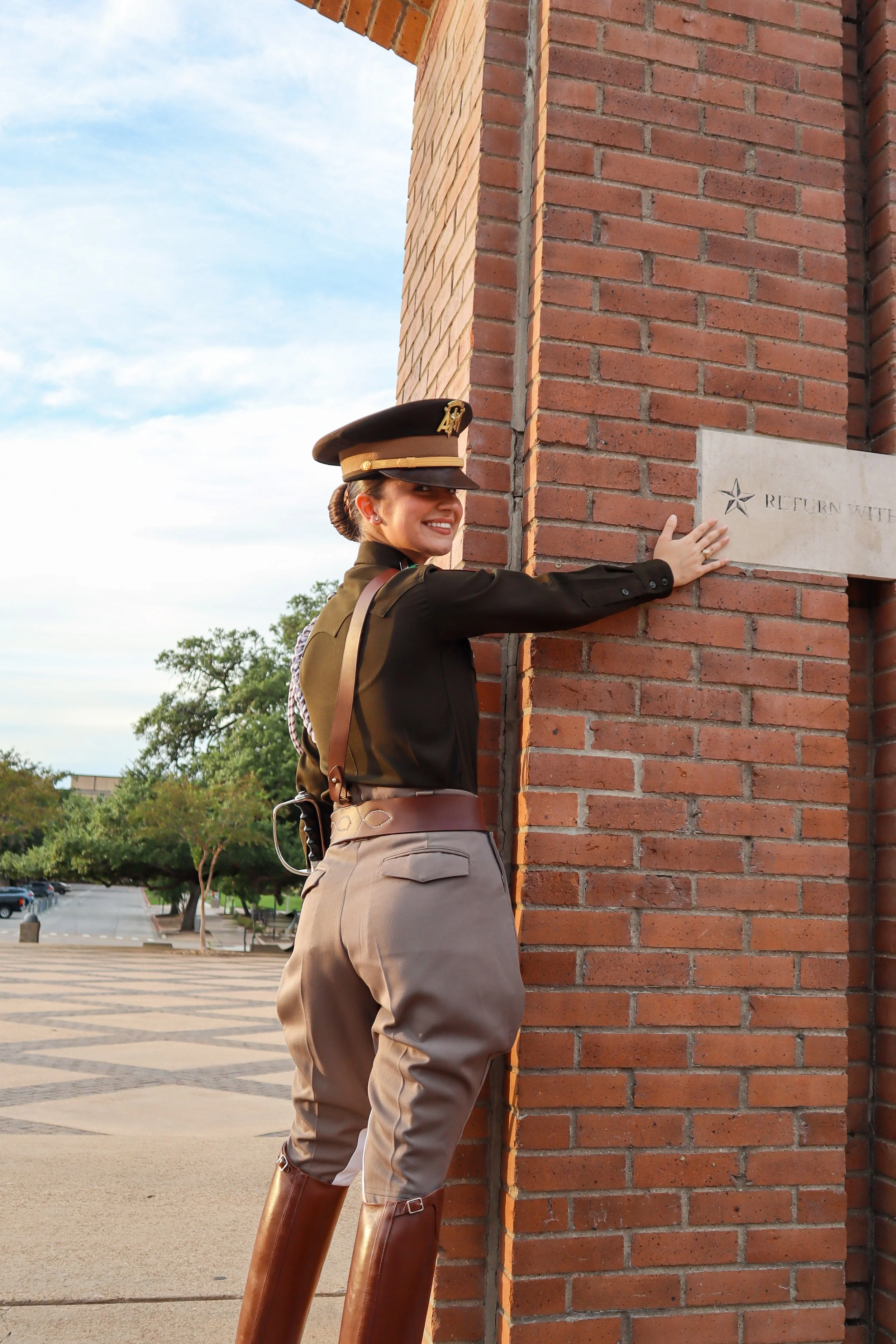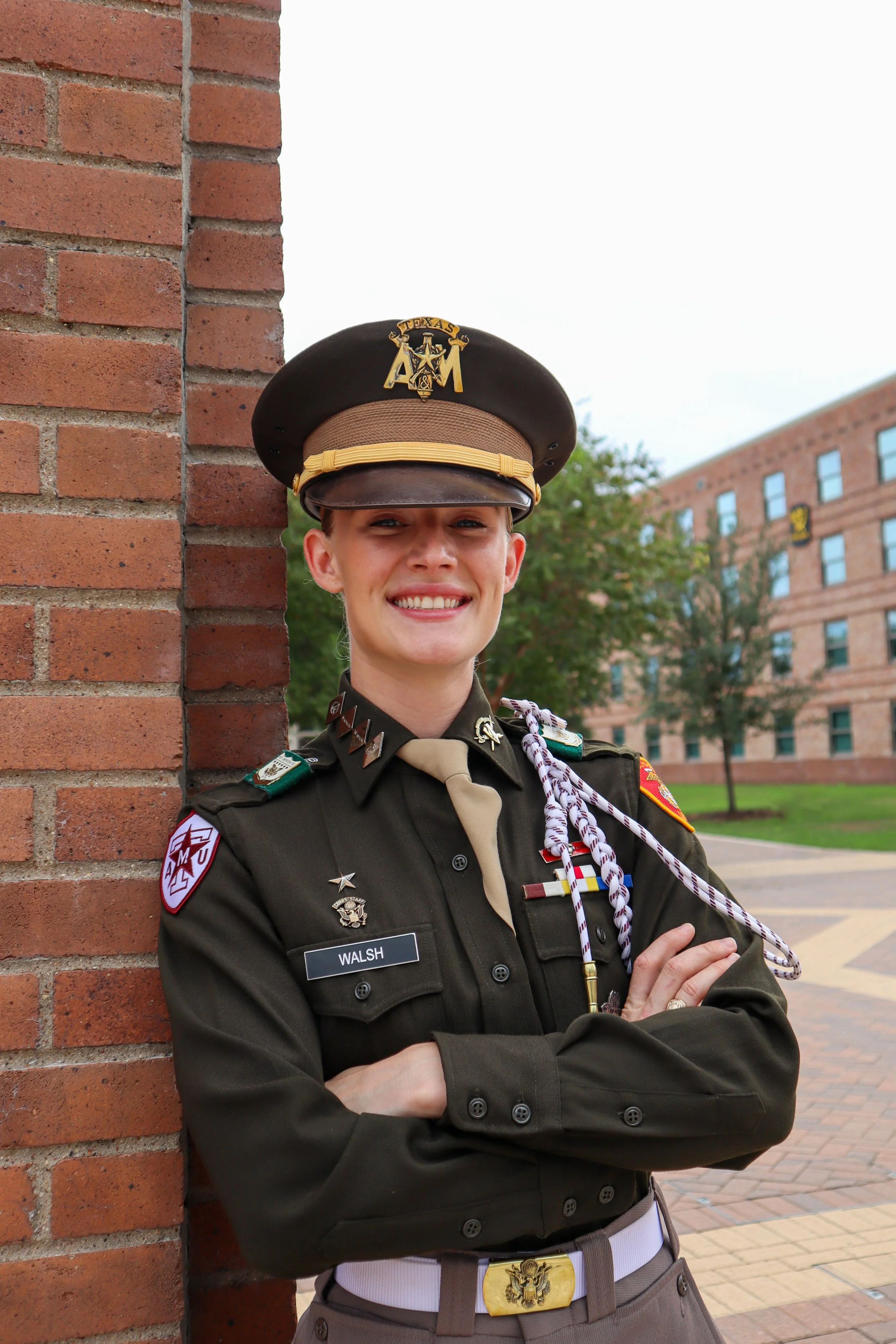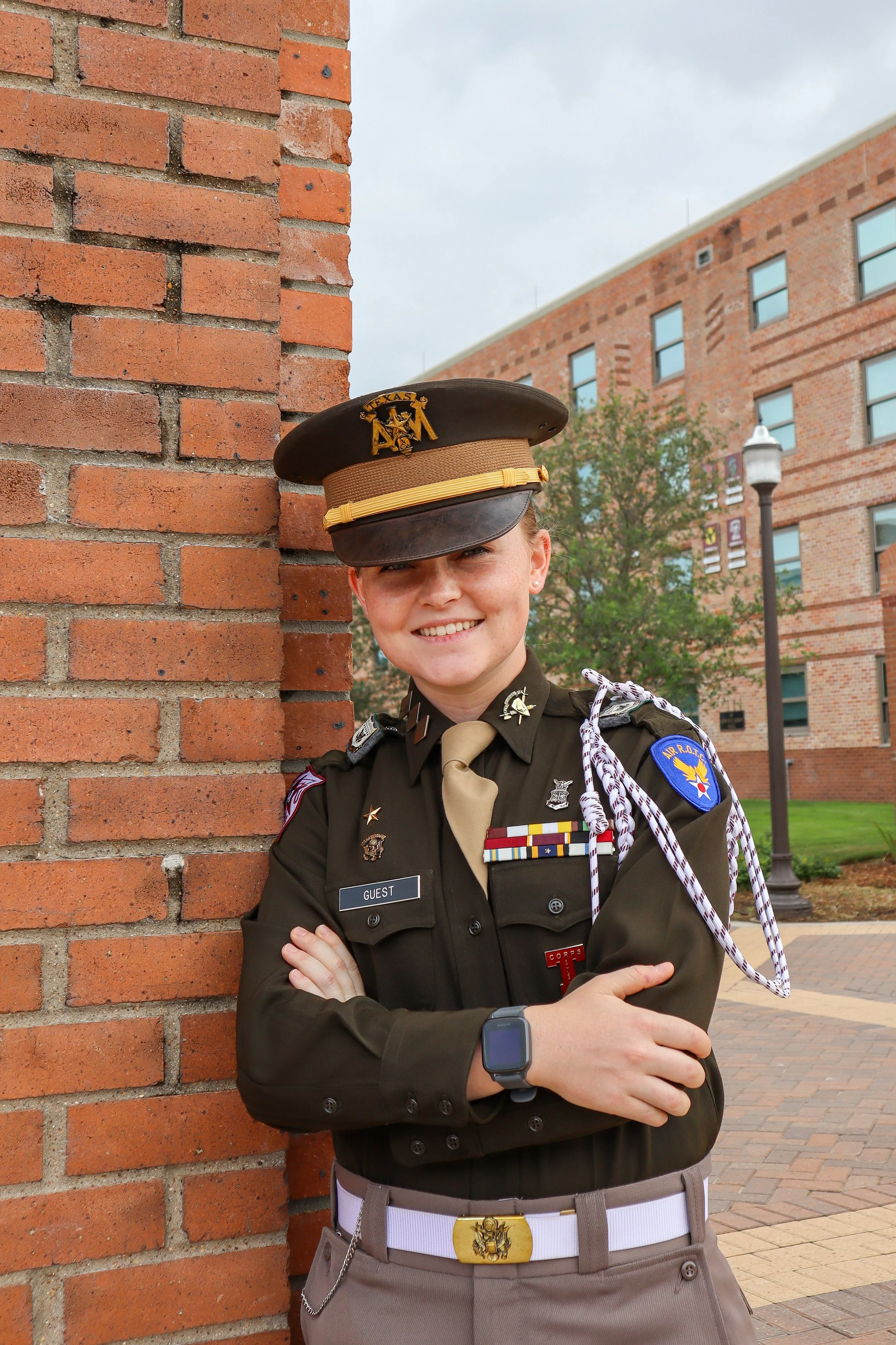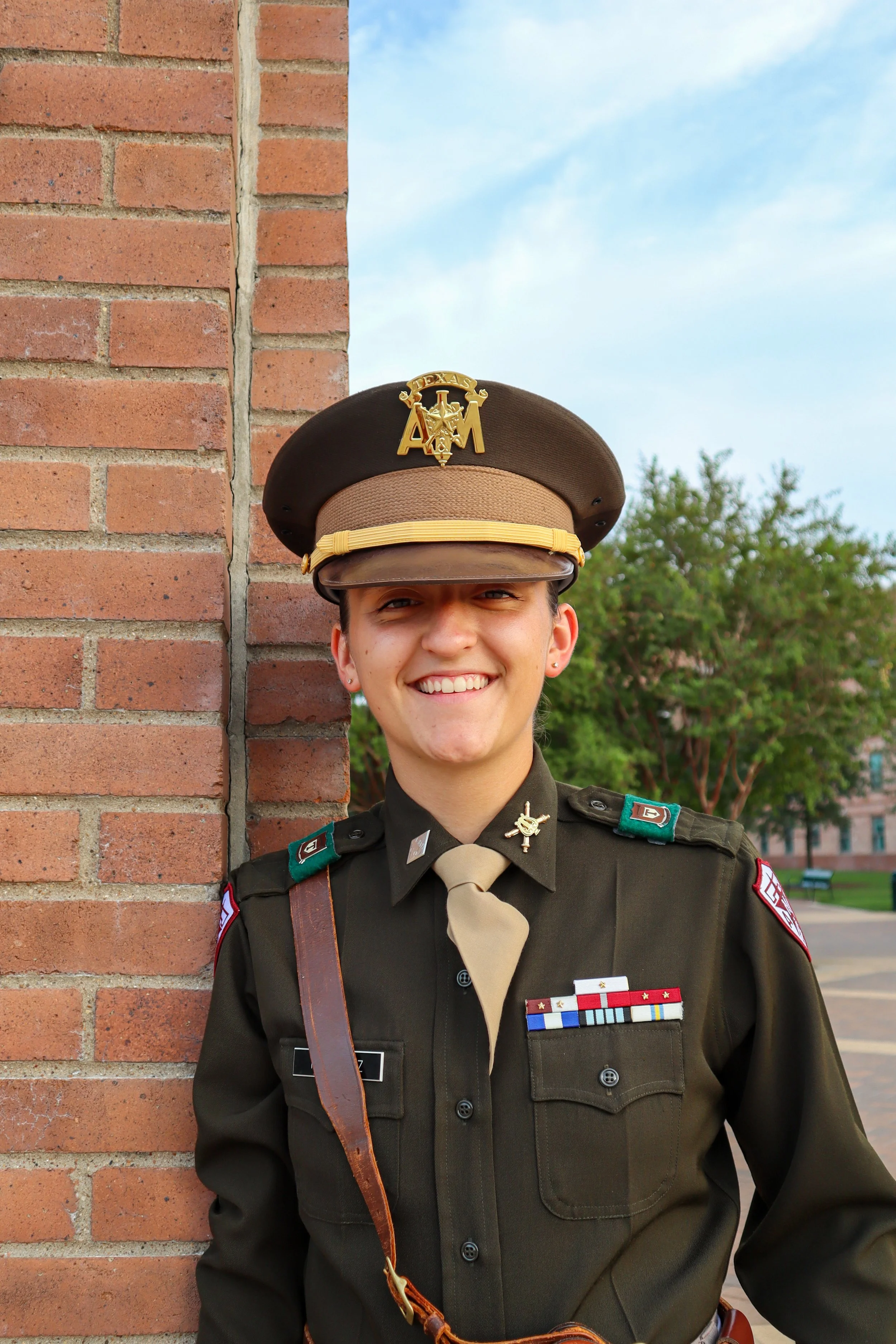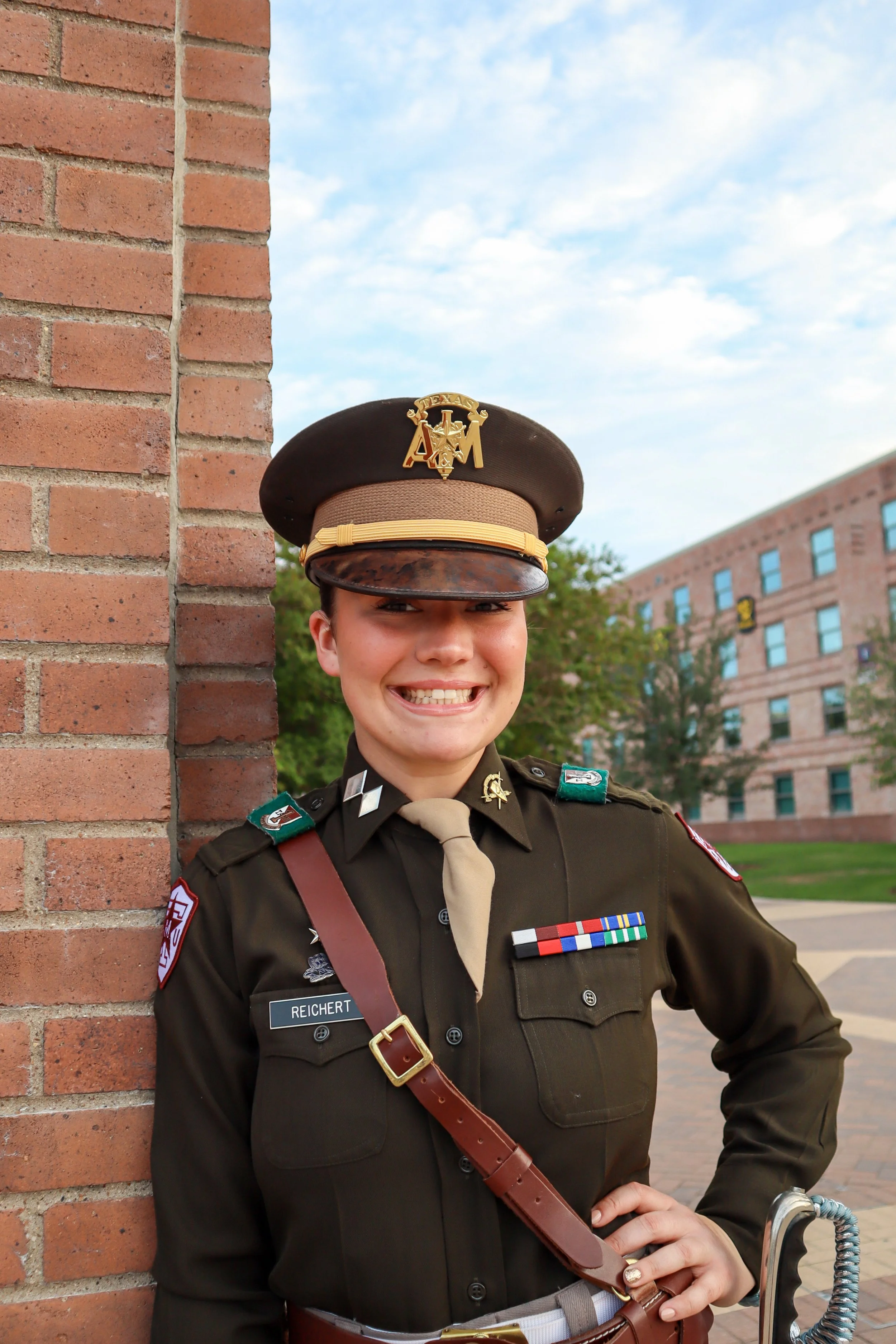From 1974 to the Class of 2024
There is, undoubtedly, no place quite like Texas A&M University. From our traditions and Aggie family to the friendly nature of campus; even the feeling of “the spirit that can ne’er be told,”- A&M holds many characteristics that are uniquely Aggie. Yet beyond the intangible experiences of being an Aggie, the true testament to A&M’s unique character lies in the history of this University. Opening our doors in 1876 as the first institute of higher education in Texas marked the beginning of the home we now call Aggieland. But it is safe to say that the campus was very different back then, especially considering that we were an all-male military institute until 1963. For almost a hundred years, it was a requirement that to be an Aggie, one had to be a male member of the Corps of Cadets.
Yet following the change of A&M presidents, James Earl Rudder made an A&M-altering decision. He opened university enrollment to non-cadets, women, and minorities. While the Corps of Cadets became optional, it remained (and still remains) a focal point of Texas A&M. With a rapid change to our university, the Corps began attracting women to become cadets. However, the introduction of female cadets did not happen overnight. It was not until the fall semester of 1974 that the Corps received its first female cadets and thus the first all-female Company; W-1 was formed, carrying the title "Minerva's Finest”. There have been many occasions of "firsts" for women in the Corps, such as the first female commander of W-1, Ruth Ann Burns, in 1976. Another big first for women in the Corps was when Gail Sedberry '77 became the first African-American woman in W-1. The Corps then embraced Mandy Scott's '87 achievement as the first female cadet to serve on Corps staff while also being among the first two women to join the Ross Volunteers, a special unit in the Corps that is the oldest honor guard in the state. Mandy Scott paved the way for Cynthia Ericson '97 to be the first female member of both the Ross Volunteers and the Parsons Mounted Cavalry; another cadet-based special unit that specializes in horsemanship. But the more recent "first" for women in the Corps was in 2015 when Alyssa (Michalke) Stipek became the first female to lead the Corps as the Corps of Cadets commander. Following that achievement, Rose Marshall ‘19 received the honor of being the first female commander of the Parsons Mounted Cavalry in the 2018-2019 academic year.
Alyssa (Michalke) Stipek and Rose Marshall’s stories and accomplishments showcase that today, women play an integral role in the Corps of Cadets leadership. Their positions range from Chaplains, Battalion Commanders, Wing Commanders, Corps of Cadet Commanders, and everything in between. But who are the women in the Corps today? What can their stories tell us about how the Corps of Cadets has changed and where the Corps of Cadets is headed? To answer these questions and unknowns, it is only fitting that current female cadets in the Class of ‘24 share their stories, perspectives, and knowledge.
Caitlynn Walsh ‘24
Corps Commander
For Caitlynn Walsh, joining the Corps aligned perfectly with her life goal: to serve in the military in some capacity. As the daughter of a Naval officer, she found her father and family a huge inspiration for seeking out a life in the military. But the road to Texas A&M was not a straight path for Caitlynn, even noting that "[she] was one-hundred percent sure she wanted to serve, but [she] wasn't one-hundred percent sure where." As a transfer student from the U.S. Coast Guard Academy, she found herself wanting a different path to commission, and after exploring what A&M had to offer, she made the decision
to pursue a Navy contract through A&M and the Corps. Finding a home and family in her outfit, D-1, she knew she had made the right choice in transferring, and during this time, she discovered the Marine Corps was her calling. Caitlynn's leadership in the Corps follows a natural progression, going from Corps Sergeant Major her junior year to Corps Commander her senior year, all for which she is incredibly grateful. As Corps Commander, Caitlynn is in charge of all members of the Corps of Cadets and is the highest-ranking (human) member.
Caitlynn's inspiration to be a better leader primarily comes from her four little sisters: Tara, Mary, Rachael, and Faith. "When I don't know what I'm doing or having a rough week, I think about them," and more so, they drive Caitlynn to be "a good example and have a positive attitude," which she says leads her "to extend that [attitude] to everybody else around [her]." In addition to her sisters, Caitlynn notes another mentor of hers, former Corps Commander Grayson Winchester '23, who aided in her leadership development. She even attributes learning an essential piece of advice under his leadership: "Character and integrity can only be lost by giving it away." Despite making mistakes, of which Caitlynn admits, “[she] probably makes mistakes every day, multiple times a day," she understands "there's always a choice to make when making a decision…and something that you can always control is doing the right thing." In her leadership, it is evident that this is not just some mantra but a way of life that she integrates into ethically leading the Corps. However, the advice she brings to the table does not end there; another lesson Caitlynn learned early as a cadet is, "You are never the smartest person in the room." She says to "be confident in yourself… and what you're strong in, but realize that you have teams for a reason" and recognize that "those people [also] have strengths." But above all else, she learned, like many cadets have to realize, "failure is the best teacher you have." Caitlynn stands as a strong leader for Texas A&M. After graduation, she intends to apply that leadership to the Marine Corps, where, upon graduation from Officer Candidate School (OCS), she will be commissioned as a Second Lieutenant.
It is only fitting that someone so in tune with all aspects of the Corps, Caitlynn, shares some wisdom with women who are also interested in joining. She recognizes that it is easy to "feel unconfident in yourself if you can't find someone to identify with," so "find a mentor early on that you can relate to" because, to her, "that helps people feel more confident (to lead)."
Callie Guest ‘24
Corps Chief of Staff
Callie's journey to A&M and the Corps starts with her older brother and his time at Texas A&M. While she fell in love with A&M, it was not until late into her junior year of high school that she learned about the Corps. Initially, she had little interest in the military but enjoyed the structure, discipline, and athletic-focused, honor-based lifestyle. But most importantly, like many cadets, she wanted to be part of something bigger than herself. She notes that the Corps was hard at first, as it is for many, but that hard work and dedication paid off and made it all worth it. Callie also says that the Corps plugged her into many mentors and inspirational leaders that she turned to for advice in and outside of her Corps responsibilities. Those mentors and the idea of being part of something bigger motivated her to seek out and earn a contract to commission in the U.S. Air Force.
Her time in the Corps taught her a lot about herself and how to serve others. She adds further that every characteristic she has and her leadership has come from watching "it modeled from someone else." Thus, the best advice she has ever received and seen modeled is to "take care of your people." Callie's philosophy is that “if you take care of your people… they will help take care of you.” building up and caring for the people you surround yourself with and look up to only makes you and everyone around you a better leader. This concept is especially prevalent in the Corps because of the natural family-like bonds formed, and Callie believes it is reinforced by the common belief that in the Corps, your buddies will "Marry and bury you." A very Corps niche saying that essentially proves the connections made in the Corps are much bigger than four years together; they span entire lifetimes, which Callie deeply values as a member of the Corps. But when asked about the most significant lesson she has learned as a cadet, her answer seems quite simple, "hard work pays off." Hard work gets you from thinking something is impossible to consider why that ever seemed unachievable. Callie has a few personal stories where she felt this lesson best applied. One is her current position as the Corps marathon team captain, and the second is her achievement in earning a pilot slot as someone commissioning into the Air Force. Both of these are incredibly competitive and something Callie never imagined happening and claims they “could not have occurred without believing in working hard.” But with her time at A&M and as a cadet coming to a close, Callie looks to apply all the lessons learned and leadership built to help her navigate life as an officer in the Air Force.
For women looking at potentially joining the Corps, Callie’s top advice is to “find a mentor.” Female, male, officer, cadet, whoever is someone worthy of looking up to, let them serve as your mentor. She further adds that the Corps and responsibilities add on each year; your mentors can help give you new perspectives and give you the knowledge they have to guide you, so listen to them. She also says to “trust the process.” In her words of wisdom, she learned firsthand that “It’s not until you cross the finish line that you can appreciate…the pain you went through.”
Rebecca Collins ‘24
1st Wing Commander
Knowing that her family wanted her to stay in Texas for college, Rebecca Collins knew that A&M was the route she wanted to take. However, her decision to join the Corps was somewhat last minute, but nonetheless, she ended up in Squadron Five. Upon entering, she fully bought in. Joining the Freshman Drill Team, contracting with the U.S. Marine Corps, and even attending the first session of OCS the summer following her freshman year, it was apparent that Rebecca would serve as an essential leader in the Corps. Her sophomore year in the Corps proved to be a success; in a position of leadership, she aided in developing the Freshman Drill Team to earn a national championship. But equally exciting was her selection as 2nd Wing Sergeant Major for her upcoming junior year and earning her instrument, commercial, and multi-engine rating pilot license that summer. In her junior year, Rebecca wanted to expand in the University and joined Aggie Sweethearts and Mariachi, all while maintaining her responsibility in the Corps. Yet, the culmination of all her hard work and dedication paid off this past summer, when she had the honor of completing OCS and earning the title of Marine. Now, as a senior, she serves as the First Wing Commander, thus putting her in charge of fourteen outfits and three groups in the Corps.
Rebecca, similar to her father, decided that the Marine Corps life was for her, but that does not mean her leadership skills were developed overnight. Rebecca had many mentors who helped get her to where she is today, one of which was Matthew Caputo '22. In a letter to Rebecca, he shared some insight into his leadership morals, telling her, "If you can go to sleep at night knowing that you did the RIGHT thing, then that's all you need." For someone who previously struggled with trying to be a people pleaser, Rebecca accounts that as the best advice she has ever received and uses it to guide her decisions today. Matthew also taught her that "Good men and women will teach." Rebecca took this to heart and believes that no one should "ever get angry at someone beneath [them] for not knowing the correct action…if you haven't taught them." In addition to Matthew's advice, she believes this to be another great piece of advice she received at OCS, "you do not become a leader until your leaders make leaders." This can be seen through the changing of leadership in the Corps, and she says she "felt most like a leader when her freshmen…became juniors" as that meant the people she led were leading others. It is this idea of developing leaders that perfectly encapsulates the Corps' goals and cadets' ability to leave a legacy in something bigger than themselves. Rebecca intends to translate this advice and all the lessons she has learned after graduation where she will serve in the Marine Corps reserves while pursuing an airline transport pilot's license.
As a well-rounded cadet and student at A&M, Rebecca’s advice to women looking into the Corps is that “[female cadets] have such a tight-knit community….[that] want to help and support you”. She adds that when it comes to achievements in the Corps, “you did earn it on your own merit, so trust in that.” As someone who works in Corps recruitment, she notes that she “wishes more women joined the Corps” saying that so many women say to her, “I could never do that, I could never do what you do” but Rebecca says “that is so not true…you absolutely could do it.” The Corps “might give you tough love…but it is a possible thing for women to do, and more women should join.”
Maisey Martinez ‘24
A-Battery Commander
Maisey Martinez and her overall contributions to the Corps of Cadets are best summarized by her number one piece of advice, "Service to others is the rent you pay for your room here on earth." As a member of the Fightin' Texas Aggie Band and the A-Battery Commander, her journey into the Corps is one of interesting circumstances and persistence. For Maisey, it all started when her plans to attend the U.S. Coast Guard Academy were changed due to a medical issue following her senior year of high school. As someone with no military influence in her family and no actual knowledge of what the Corps was, interestingly enough, she found herself only joining for guaranteed housing on campus. Due to recurring medical issues after the conclusion of her freshman year, she decided to leave the Corps. However, she found life boring as an average college student and missed the challenge and constant business. Thus, her journey continued as she decided to join A-Battery.
For her, everything she has done since joining the Corps is to better her ability to serve others. She wakes up daily and finds purpose in creating better opportunities for those around her and those under her leadership. Among many lessons learned, Maiseysays the biggest one she learned was “level-headedness”. “Learning to rely on others and ask questions can be hard”; as she recalls from her first introduction to the Corps, she believes it makes one a “much more rational decision-maker” and produces leaders who are confident in their character and abilities. After graduating, Maisey plans to apply her lessons learned to law school, something she has wanted to do her entire life. She notes that for most of her life, she has been “going 200 miles per hour” and intends to take some time to slow down, but all in all she may eventually seek out a commission as a military attorney. With an exciting future and a solid foundation of leadership from the Corps, the possibilities for Maisey and other cadets truly are vast.
For any cadet looking to join the Corps, especially women, Maisey’s piece of advice is to “decide failure is not an option.” She further says that when you “decide you are going to succeed…you will.” She advises future cadets to “commit themselves wholeheartedly” and that spending time debating and contemplating going back on a decision is a waste of productive time that could be spent getting better.
Maisey also wanted to take the time to recognize just how privileged her opportunities in the Corps have been, saying that “[women in the Corps] are where [they] are because somebody went first.” While Maisey gets to enjoy the same respect, responsibilities, and perks of being in the Corps that male cadets do, she is adamant about acknowledging that the women who paved the way did not have those same luxuries, and is grateful for the foundation these women have built for her and all other female cadets. Maisey recognizes all that she could inherit as a female cadet drives her to be even better so that “someday, someone is better off” because of her ability to lead.
Sarah McMurry ‘24
7th Battalion Commander
Coming from a family of Aggies and as the daughter of an Air Force officer who was commissioned from the Corps, Sarah McMurry knew from a young age that A&M and the Corps were where she needed to be. Feeling confident that she wanted to serve her country like her father, she knew that going to a place like A&M would help her make connections in the military that would set her up for success. But this goal to join the Aggie family was solidified when Sarah’s parents decided to host Muster while stationed in Germany for other Aggie families. Seeing the connections formed between Aggies and hearing her father's stories of his time as a cadet continued to drive her to apply to A&M.
In committing herself to A&M and the Corps, Sarah has learned much of what it means to be a leader and recalls that some of the best advice she has ever received is “We stand on the shoulders of giants, and it's our job to be those giants for the people who come after us.” Being a mentor and waking up “every day doing the best [she] can” is the expectation for her. Much like the women who set up current female cadets for success, Sarah recognizes the work she can [and does] put in for the betterment of those who will come after her. Yet, she notes a second prevalent piece of advice in her life, saying, “The grass is greener where you water it… it’s really easy to compare yourself to other people” and get stuck in the mentality [of] “I should have gone there, or I wish I did this.” Still, Sarah believes, "Wherever you pour your time into, and whoever you pour your time into, that’s what’s going to be the best experience.” Even in instances of upset or failure, she says, “Stick through it because you made a commitment…give it your best effort and follow through.” But while these pieces of advice have solid application during Sarah’s time in the Corps, her biggest lesson as a cadet is “nobody cares about your excuses.” While this was a hard lesson to learn, she believes “it’s an important lesson that will set you up for success in the future, especially if your plan is to go into the military.” Of course, she distinguishes that this works “within reason…as we are humans,” but as a determined and efficient member of the Corps, this is a lesson Sarah has resonated with as a cadet and future officer. Living a military-motivated life, Sarah intends to take the hard lessons and good advice with her to the Navy. After graduation, she will be commissioned as an Ensign in the U.S. Navy and hopes to serve as a pilot for some time and potentially become a foreign area officer.
As an outgoing senior of the Corps, Sarah has a lot of insight about how best to set oneself up for success in the Corps, so her advice for any prospective cadet, especially female perspective cadets, is “Don’t let anyone get to you…as soon as you let anyone get under your skin the issue becomes a bigger thing.” Then, adding that the sooner a potential cadet learns this lesson, “it’ll make things a lot easier.”
Alexa Reichert ‘24
3rd Battalion Commander
Alexa Reichert felt compelled to try something different because her entire family wanted her to be an Aggie. However, when her brother embarked on going to the U.S. Naval Academy, it inspired her to seek a similar lifestyle. Therefore, after earning an Army ROTC scholarship, she set out to join the Corps. She recalls that at first, the "Corps was not at all what [she] thought it would be," but she "liked who she was becoming…and the discipline aspect." Alexa found that she "enjoyed the regiment …waking up early," but mostly, she "loved the competitive drive" and started building the mentality that "if [others] can do this, so can I." So, despite being unsure of what to expect out of the Corps fully, it was something she stayed persistent in and found the ability to grow into a leader.
The Corps has been a massive point of learning for Alexa, with one of those lessons happening her freshman year when a mentor of hers asked, "Are you living for the approval of man or are you going to live for the approval of your faith?" As a self-proclaimed people pleaser, this advice and question reassured her that if she "sticks with [her] morals, values, and faith …[she's] doing the right thing" and opened her eyes that the opinions of others don't matter. Alexa uses this to help her lead the Corps 3rd Battalion, but clearly, that Corps has taught her so much more. Another significant lesson she had to learn was discipline, which she cultivated from the routine of the Corps. It is this exact discipline that she is currently getting one step closer to commissioning in the Army. Previously, Alexa had accepted that she did not want to be commissioned through the Army ROTC scholarship and felt that "after the Army didn't work out, I pretty much accepted the fact [that] the military was not for me," saying she thought that she, "gave the Army everything [she] had." But her discipline to stay committed is what is driving her reapplication to the commission, and is currently seeing through that process.
Alexa brings a lot of experience and new perspectives to the Corps and has some advice for women interested in applying. "Do not listen to the opinions of others…if you have a goal, take it head-on," she says. She recalls that she has been told in life, "You probably won't get it. You shouldn't even try." Still, to her, "That's a testament to who they are, and it's a testament to your character if you do reach that goal and take it head on." As a cadet and person, she has found that "It's your personal ability and character and drive that is going to get you where you want to go." She also has advice regarding the lessons she learned in a predominantly male-dominated environment. There is a value in women joining the Corps and in "femininity…and embracing that." She adds further by stating, "The guys are like my brothers, and I can hang with them, but I don't have to be one of them."
In my brief conversations with these cadets, it is clear that women’s contributions to the Corps are insurmountable. Their humble leadership, commitment to the mission, and selfless service mindset breed great leaders. Their ability to inspire goes beyond the Corps. Their impact and leadership can be seen in Fish Camp, women’s organizations, athletic teams, professional organizations, and everything in between. While women might have had a late start to joining the ranks of the Corps, they perfectly match and foster the expectations and goals set decades before their arrival. While these are only six stories and faces amongst the women of the Corps, it is stories like theirs that keep alive the sacrifice and legacy of the women who came before them and serve as the foundation for all the women who will come after them. The future is bright for these cadets and in all that they achieve in life, they carry with them the values and morals of Texas A&M and the Corps of Cadets.
Written by Leah Lara, Photography: Grace Weng, Social Media: Madelyn Jordan

